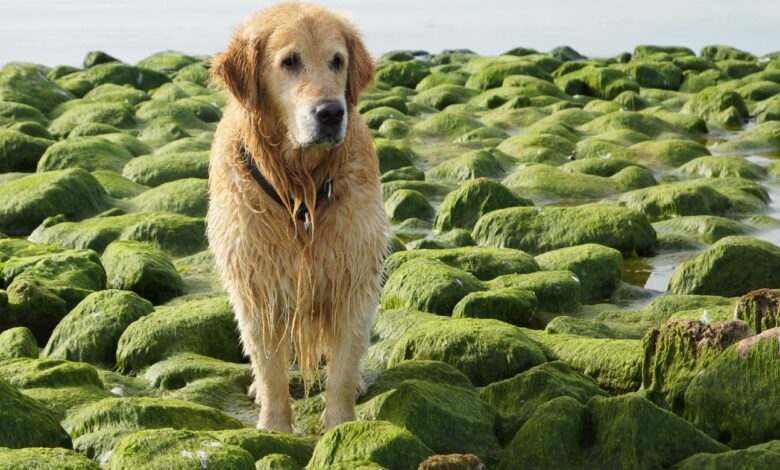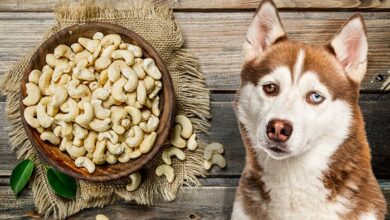Can Dogs Eat Sea Moss? Exploring the Nutritional Value-2024

Can Dogs Eat Sea Moss? Sea moss is a type of seaweed commonly found along the Atlantic coasts. It’s known for its rich nutrient profile, including vitamins, minerals, and antioxidants that make it popular in human diets for its potential health benefits.
But is it safe for dogs to consume? In this article, we’ll explore what sea moss is, its nutritional value, and whether it’s a healthy addition to your dog’s diet. Let’s take a closer look at the benefits and precautions of feeding sea moss to your furry friend! Now let’s discuss briefly that- Can Dogs Eat Sea Moss?
Nutritional Content of Sea Moss-Can Dogs Eat Sea Moss?
Can Dogs Eat Sea Moss? Sea moss is a nutrient-dense superfood that offers various benefits for both humans and dogs. Understanding its nutritional content can help you determine how to safely incorporate it into your dog’s diet. Here are some key nutrients found in sea moss and how they can benefit your dog:
Iodine
Thyroid Support:
Iodine plays a crucial role in supporting healthy thyroid function, which helps regulate metabolism and energy levels. However, excessive iodine can disrupt thyroid function, so it’s important to provide sea moss in controlled amounts to avoid overconsumption.
- Tip: Dogs with thyroid conditions or iodine sensitivities should avoid sea moss.
Iron
Oxygen Transport:
Iron is essential for the production of hemoglobin, which carries oxygen throughout the body. Sea moss can help maintain healthy iron levels, supporting overall energy and vitality in your dog.
- Tip: Sea moss can be beneficial for dogs with iron deficiencies, but overfeeding could lead to iron toxicity, so moderation is key.
Calcium and Magnesium
Bone Health:
Calcium and magnesium are essential minerals for maintaining strong bones and teeth. They also play a role in muscle function and nerve transmission. Sea moss contains both of these minerals, contributing to your dog’s overall bone health.
- Tip: Sea moss can be a helpful supplement for senior dogs or those at risk of developing bone-related issues like arthritis.
Fiber
Digestive Health:
The fiber content in sea moss supports healthy digestion by regulating bowel movements and promoting gut health. It can help alleviate constipation and encourage a balanced digestive system.
- Tip: Introduce sea moss gradually to avoid digestive upset, especially in dogs with sensitive stomachs.
Can Dogs Eat Sea Moss? Sea moss is packed with essential nutrients like iodine, iron, calcium, magnesium, and fiber, making it a valuable addition to your dog’s diet in moderation. However, it’s important to monitor the amount you give your dog to avoid any potential risks associated with overconsumption. Always consult with a veterinarian to ensure it’s a safe and suitable supplement for your pet.
Can Dogs Benefit from Sea Moss?
Can Dogs Eat Sea Moss? Sea moss is a nutrient-rich superfood that can offer several potential health benefits for dogs when fed in moderation. Here’s how sea moss can support your dog’s overall well-being:
Essential Nutrients for Overall Health
Rich in Vital Nutrients:
Sea moss contains a variety of essential nutrients like iodine, calcium, magnesium, iron, and fiber, which are crucial for your dog’s general health. These nutrients help maintain bodily functions, promote energy levels, and support growth.
- Tip: Organic sea moss is the best choice for providing these nutrients without harmful additives or contaminants.
Promotes Better Digestion
Digestive Health:
The natural fiber found in sea moss supports healthy digestion by helping to regulate bowel movements. It can improve gut health and may help relieve constipation or digestive discomfort.
- Tip: Start with small amounts and monitor your dog’s digestion to ensure they tolerate sea moss well.
Enhances Skin and Coat Health
Omega-3 Fatty Acids:
Sea moss is a source of omega-3 fatty acids, which are known for their positive effects on skin and coat health. Omega-3s can contribute to a shiny, smooth coat and help reduce skin irritation, itching, or dryness.
- Tip: Sea moss can be a great supplement for dogs with dry or sensitive skin.
Antioxidant Support for the Immune System
Boosts Immune Function:
The antioxidants in sea moss help protect your dog’s body from harmful free radicals, supporting a strong immune system. This can enhance your dog’s ability to fight off illnesses and infections.
- Tip: Regular, moderate consumption of sea moss may help keep your dog’s immune system robust, especially in older dogs or those with weakened immune functions.
Can Dogs Eat Sea Moss? When used correctly, sea moss can offer a range of health benefits for dogs, from boosting immunity to promoting digestive and skin health. However, like any supplement, it should be introduced gradually and in moderation. Always consult your veterinarian to ensure sea moss is suitable for your dog’s specific needs.
Potential Risks of Sea Moss for Dogs
Can Dogs Eat Sea Moss? While sea moss offers various health benefits for dogs, it is important to be aware of the potential risks associated with feeding it to your pet. Here are some key concerns to keep in mind:
Iodine Overdose
Thyroid Imbalances:
Sea moss is naturally high in iodine, which is essential for thyroid function. However, too much iodine can lead to thyroid imbalances, affecting your dog’s metabolism and overall health.
- Tip: Always feed sea moss in controlled, small amounts and avoid excessive intake to prevent iodine toxicity.
Contamination
Heavy Metals and Toxins:
Sea moss is harvested from the ocean, and if sourced from polluted waters, it may contain harmful contaminants such as heavy metals or toxins. These can pose serious health risks to your dog if consumed.
- Tip: Only choose organic, high-quality sea moss from reputable suppliers to minimize the risk of contamination.
Digestive Upset
Excess Fiber:
Sea moss contains fiber, which is great for digestion in moderation. However, too much fiber can cause digestive upset, leading to symptoms like bloating, diarrhea, or discomfort.
- Tip: Introduce sea moss slowly into your dog’s diet and monitor for any signs of digestive issues. If your dog shows discomfort, reduce or stop giving sea moss.
Can Dogs Eat Sea Moss? While sea moss can be a nutritious addition to your dog’s diet, it’s crucial to be mindful of the potential risks, including iodine overdose, contamination, and digestive upset. Always consult with your veterinarian before introducing new foods like sea moss and ensure that it’s sourced properly and served in moderation.
How to Include Sea Moss in Your Dog’s Diet
Can Dogs Eat Sea Moss? If you decide to add sea moss to your dog’s diet, it’s essential to do so carefully and in moderation. Here are some helpful guidelines to follow:
Start with Small Portions
Gradual Introduction:
Begin by adding small amounts of sea moss to your dog’s regular food. This helps you monitor how your dog reacts to it without overwhelming their digestive system.
- Tip: Start with a pinch or a teaspoon, depending on your dog’s size, and observe for any signs of intolerance or digestive issues.
Ensure It’s Organic and Thoroughly Rinsed
Choose High-Quality Sea Moss:
Only use organic sea moss that is free from additives or preservatives. This ensures you’re giving your dog the most natural and safe form of sea moss.
- Rinse Well: Thoroughly rinse the sea moss to remove salt, sand, and any potential contaminants. This is crucial for avoiding digestive upset or exposure to harmful substances.
Use as an Occasional Supplement
Not a Daily Food:
Sea moss should be considered an occasional supplement, not a regular part of your dog’s diet. Its nutrients can be beneficial, but overfeeding could lead to issues like iodine overload or digestive upset.
- Tip: Serve sea moss once or twice a week, depending on your dog’s size and dietary needs.
Can Dogs Eat Sea Moss? Incorporating sea moss into your dog’s diet can be a great way to boost their health, but it’s important to do so carefully. Start with small portions, ensure it’s organic and properly rinsed, and only use it as an occasional supplement to avoid potential risks. Always monitor your dog’s health and consult your vet if you have any concerns.
Should All Dogs Eat Sea Moss?
While sea moss offers several health benefits for dogs, it may not be suitable for all pets. It’s important to consider certain factors before introducing it to your dog’s diet.
Not Recommended for Dogs with Thyroid or Iodine Sensitivity
Thyroid Concerns:
Dogs with thyroid disorders or sensitivities to iodine should avoid sea moss. Its high iodine content can disrupt thyroid function and lead to complications.
- Tip: If your dog has thyroid issues, consult your veterinarian before adding any iodine-rich food like sea moss.
Consult a Veterinarian Before Introducing Sea Moss
Puppies and Senior Dogs:
Puppies and senior dogs, whose health may be more delicate, should also be assessed by a vet before sea moss is included in their diet.
- Tip: A veterinarian will be able to recommend whether sea moss is appropriate for your dog based on its individual health needs.
Consider Other Nutrient-Rich Alternatives
Alternative Greens:
If you’re unsure about feeding sea moss, consider other nutrient-rich options like spinach, kale, or other dog-safe vegetables. These can provide similar benefits without the iodine risks.
- Tip: Always choose vegetables that are safe for dogs and offer a balanced approach to nutrients.
Conclusion
Can Dogs Eat Sea Moss? Sea moss isn’t recommended for all dogs, particularly those with thyroid or iodine sensitivities. Before introducing it to your pet, always consult a veterinarian, especially for puppies or senior dogs. If you’re uncertain, there are plenty of other nutritious alternatives that can support your dog’s health safely.




